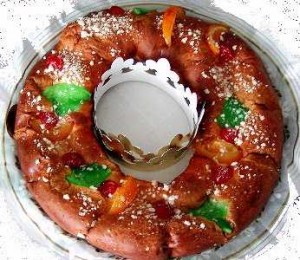
Here in Spain, I have three very excited (read loud!) children. Why? Because here in Spain, and many Catholic countries around the world, it is Twelfth Night or the eve of Epiphany. The Three Kings come tonight!
My Twelfth Night and Epiphany
Tonight we will brave the cold and wait for the Three Kings. Here, they come on the back of a truck, rather than on camels, and they throw sweets out behind the truck as they travel through the winding streets of our village. We go armed with big bags to collect the sweets and we join the crowd who follow the truck, spending most of their time on their hands and knees picking up sweets. Once the sweets have gone, we follow the Three Kings to our local theatre where they give out presents to the children and then it’s back home to bed to see if the Three Kings will come in the night and leave presents. Exciting!
Tomorrow, we will enjoy our Kings’ Day roscon, a cake filled with cream and decorated with candied fruit, and see who can find the King figure and the bean. The bean used to be lucky but now the person who finds the bean has to pay for the cake and the person who finds the King is crowned King of Epiphany – you get a gold cardboard crown with the cake.
It’s funny how this tradition has died out in many countries. Epiphany is just a normal work day in many societies, yet it is the day that celebrates the visit of the Three Kings or magi to the baby Jesus. It has much more of a significance than Santa, if you think about it. Spanish children visit our house to see our Christmas tree, the Santa hanging from our balcony, our cards and decoration, because here Santa or “Papa Noel” is a new phenomenon; here, Christmas Eve and Epiphany are the important celebrations and it’s all about Mary and her precious son, Jesus, not a man dressed in red and sometimes it’s nice to learn from other cultures because they make you think about the real meaning of things. In many countries, we just think of Twelfth Night as a time to take the Christmas decorations down, after all, we don’t want bad luck!
(see slideshow for our photos from tonight’s Twelfth Night Celebrations)
[slideshow id=177 w=400 h=300]
Why am I writing all this on The Anne Boleyn Files? Well, it’s certainly not to preach, because I love Santa, but it’s because these present day Twelfth Night and Epiphany celebrations hearken back to Medieval and Tudor times.
Epiphany in Tudor Times
The eve of Epiphany, Twelfth Night, marked the end of the Twelve Days of Christmas and also the winter festival that started at All Hallows Eve (Halloween). If you have read the “Tudor Christmas” page, you will know that the Twelve Days of Christmas were twelve days of celebration and a time where communities would come together to celebrate and bring cheer to this usually miserable time of year.
During these twelve days, a commoner would play the part of the “Lord of Misrule”, turning things on their head, and he, not the King, would be in charge of choosing and organising entertainment and revelry. His reign would end on Twelfth Night, but there would be lots of fun to be had before that! To give you an idea of how outrageous the entertainment could be, Alison Sims (“Pleasures and Pastimes in Tudor England”) writes:-
“At the Inner Temple a fox and a cat were let loose in the hall on St Stephen’s Day (Boxing Day) and hunted with a pack of hounds until the two were torn to pieces.”
Mad!
One article I read online (http://midrealm.org/scacolumbus/12th%20Night/history.php) states that on Twelfth Night a cake containing a bean would be eaten, just like our present day roscon. The person who found the bean in their slice of cake would be in charge of the Twelfth Night feast which would probably have also been accompanied by a masque or by dancing, and then that person’s reign, and the reign of the Lord of Misrule, would end at midnight. A church service would also be attended by Tudor people. Poet, Robert Herrick, writes in his poem “Twelfth Night” (or King and Queen) from 1648:-
“Now, now the mirth comes
With the cake full of plums,
Where bean’s the king of the sport here ;
Beside we must know,
The pea also
Must revel, as queen, in the court here.”
So, the person who found the bean became “king of sport” and the person who found the pea played Queen. Herrick also writes of how the “King” and “Queen” of the Twelfth Night festivities would be toasted with a drink of “lambswool” as a wassail drink (see “An Elizabethan Christmas” over at The Elizabeth Files for details). Don’t you sometimes wish we had these festivities still today?!
Did you know that William Shakespeare’s play “Twelfth Night” was actually written to be entertainment for Twelfth Night in Elizabethan times?
Do you celebrate Twelfth Night or Epiphany? If so, what do you do?
Happy Twelfth Night and Kings’ Day!
P.S. Remember to vote for your favourite Anne Boleyn Dress – see Anne Boleyn Dresses.